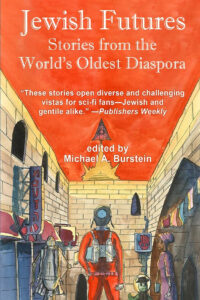Last year, Michael A. Burstein edited a new collection of original Jewish science fiction stories called Jewish Futures. Michael worked with Ian Randal Strock, publisher of Fantastic Books, to produce the book as a Kickstarter project, and it raised more money than any of the previous Fantastic Books anthologies funded through Kickstarter. They hit their top stretch goal, which was to do a second anthology of stories, and this time around, Michael is looking for Jewish fantasy as well as science fiction, even though the current working title is Jewish Futures 2. They are open to submissions now and plan to publish the book in the fall.
File 770: Michael, to begin with, tell us a little bit about the first Jewish Futures. Where did the idea come from?

MAB: Well, as I say to anyone who asks, I was inspired by the two Wandering Stars books that Jack Dann edited in the 1970s and 1980s. Wandering Stars was published in 1974, and it was the first time, as far as I know, that someone had put together a collection of specifically Jewish science fiction and fantasy stories. The book included a mix of original and reprint stories, and some of them have stayed with me all my life. Since then, there have been other Jewish SF collections, but I’ve always wanted to do a book that would be a spiritual successor to the Wandering Stars books. Fortunately for me, Ian Randal Strock, the publisher of Fantastic Books, agreed, and we managed to launch it last year by doing it as a Kickstarter.
File 770: And now you’re committed to a second book?
MAB: Yeah, and we really weren’t expecting that to happen! We included it as a stretch goal if we managed to raise twice the money we needed just to do the first book, and we actually reached that goal. So as it is, everyone who backed the project at $5 or more will get the ebook of Jewish Futures 2 for free, as that was the promised stretch goal. But obviously, Ian and I are hoping that enough readers out there will want to buy the book in print and that other readers will be interested in the ebook too.
File 770: This is the first time you edited a book of short stories, yes? Did you find anything surprising about the experience?

MAB: Just for the record, a few years ago I guest edited an issue of Apex Magazine. But yeah, this is the first book of other writers’ short stories that I put together. One thing that surprised me were the questions I got when we posted submission guidelines. It hadn’t occurred to me to state explicitly that we were OK with multiple submissions but not with simultaneous submissions, so we had to add that. We also had people wondering if you had to be Jewish to have a story in the book, and the answer is not at all. In fact, the first book includes a story by writer Shane Tourtellotte, who is not Jewish at all but did his research. I told him his story read to me as if he had swallowed a Talmud.
As for the current book, we’ve had people ask if they could resubmit stories that I had to turn down for the first book. I’ve added to the guidelines that they are welcome to, but of course I hope they’re aware that these stories still might not get in, even if last time we sent them an encouraging note. Because, sadly, I don’t have the ability to purchase every story that gets submitted. There will no doubt be stories I read that I really like, but in the end, I simply won’t have room for, whether it is because they are too close in theme or idea to another story or for some other reason.
File 770: What makes Jewish science fiction different from other science fiction?
MAB: I suppose the obvious answer is that it has to have some sort of Jewish content. I could say something like, if you remove the Jewish content then you don’t have the same story anymore, and in a way that’s true.
File 770: Are there any inherent difficulties in making a genre story also a Jewish story?
MAB: There certainly can be! One issue writers need to address is how to craft a story that is accessible to both audiences: Jewish readers and science-fiction readers. I had some stories submitted that dove deeply into the minutiae of Jewish religious practice and how technology might affect that, and I love those kinds of stories. But they need to be accessible to the reader who knows nothing or very little about such practices. Leah Cypess handled this well in her story “Frummer House,” about a non-observant Jewish family whose house AI gets an update that assumes they are religiously observant and starts trying to force observance onto them. By presenting her story in that way, she is able to introduce the more obscure concepts to the general reader as the story moves along. It’s kind of like how the protagonist in Roger Zelazny’s Chronicles of Amber series starts with amnesia. The reader gets to learn about the world he lives in along with him.
I would suggest that someone who writes a story dependent on Jewish minutiae run it by a few non-Jewish beta readers. Find out what they don’t understand and edit the story accordingly. But I will admit that it can be a difficult thing to balance, presenting an introduction to Jewish concepts for the readers who need it but also avoiding boredom in a reader who is already familiar with the concepts you need for the story.
File 770: Finally, as long as you’re offering suggestions, is there any advice you would give to writers trying to sell a story to Jewish Futures 2? Is there any way to improve their chances?
MAB: Well, other than the obvious thing, which is that you should write a good story, one thing to think about is how to be original with your concept and theme. For example, when it comes to Jewish fantasy, many writers look to the legend of the golem as a place to start. Now, there are some excellent golem stories out there; I even bought one for Jewish Futures: “Baby Golem” by Barbara Krasnoff. But in general, you want to consider that many other writers might also think about writing about a golem, and I’m not likely to take more than one unless there is a compelling reason to do so.
What I really want is a story that makes me think as well as entertain. I’ll put it this way: the stories I ended up accepting for the first Jewish Futures were stories that essentially lingered in my mind after I read them. They wouldn’t let me go. They were stories that made me go back to them, to read them again and again.
Discover more from File 770
Subscribe to get the latest posts to your email.
